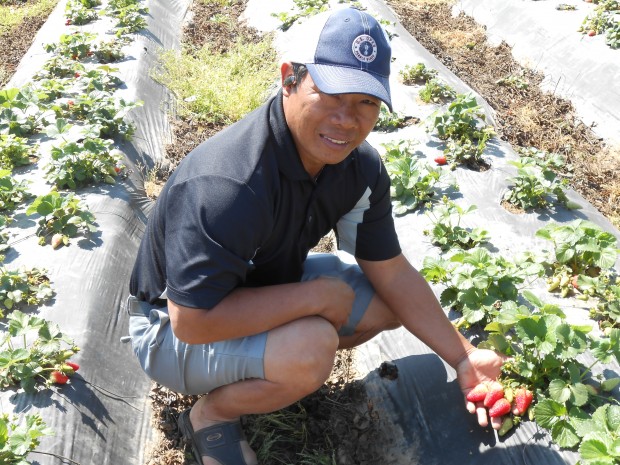“We have farmed a long time, but this is my passion, to be farming something that feeds local,” says Saephan.
Saephan is the first small farmer to sell his produce directly to Fresno Unified. He could pave the way for other small farmers to begin selling their produce directly with the school district.
Jose Alvarado, food services director for Fresno Unified notes that the district is located in the "produce and vegetable capital" of the world. “We have been taking advantage of that," he says, "but now it’s taking it to another level, from the farmer, when the occasion is right, and it meets our needs. Strawberries were just a natural for us."
Alvarado hopes every Fresno Unified student can taste Saephan’s strawberries at their peak. His goal, he said, is for children to “experience fresh produce and make healthy eating choices over a lifetime.”
Still, he acknowledged that there are several barriers to linking small farms and large school districts. For logistical reasons, it’s often easier for school districts to buy produce from large distributors.
“Some school districts like to work with one company: you go to the grocery store, not the cucumber stand, the broccoli stand, the strawberry stand,” Alvarado said.
He said another challenge is that some small farmers are not trained in food safety.
“Pao is our first step to truly go to the farm – we have worked with other farmers, this is one where the farmer was lacking all the food safety certifications," Alvarado said. "We’re breaking new ground with Pao, and learning what it takes for him to be certified."
Despite those barriers, Alvarado said there are many benefits to buying produce, and especially strawberries, from local farmers. Among those is the cost.
The district serves about 85,000 meals a day. Alvarado’s goal is for each of those meals to include three or four of Saephan’s beauties.
“A locally grown strawberry that we buy from the farmer more than likely will be more cost effective for the district," Alvarado said. "But that’s not the driver."
Beyond dollars, strawberries are one of those fruits that just taste better when they’re picked fully ripe.
“The driver is, fresh products that taste good are more likely to be eaten than products that don’t," Alvarado said. "If they don’t eat it, we’re wasting money." Plus fruits and vegetables in school lunches that end up in the trash aren't helping children's overall nutrition either.
Fresno Unified students should start seeing Saephan’s berries on the menu in May.
